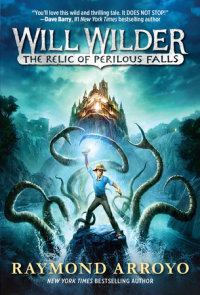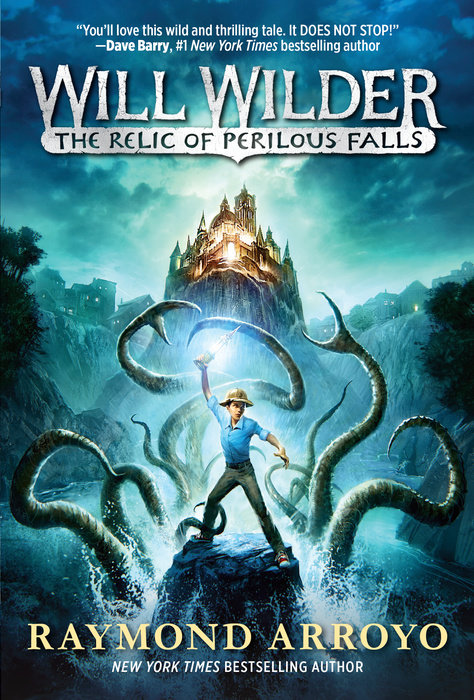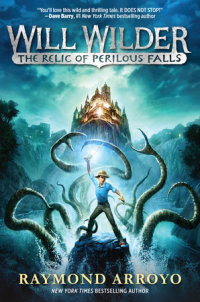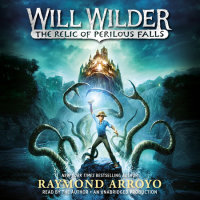Will Wilder #1: The Relic of Perilous Falls
Will Wilder #1: The Relic of Perilous Falls is a part of the Will Wilder collection.
Fans of Rick Riordan’s Percy Jackson and the Olympians and Peter Lerangis’s Seven Wonders series will embrace this epic adventure in a rollicking new series by a New York Times bestselling author.
Will Wilder didn’t mean to unlock his otherworldly gift. But that is exactly what happens when Will “borrows” a sacred relic believed to protect the town of Perilous Falls for nearly a century. Even though his intentions are good, the impulsive twelve-year-old unwittingly awakens an ancient evil endangering all of Perilous Falls.
As boats sink and hideous creatures crawl from the rising waters, it is up to Will to confront a nightmarish enemy and set things right before it is too late. Along with his sweet—if lethal—great-aunt Lucille, the curator of a museum of supernatural artifacts, Will proves that the actions of one twelve-year-old boy can change the world.
An Excerpt fromWill Wilder #1: The Relic of Perilous Falls
Chapter 1
A Ride in the Yard
All Will Wilder meant to do was ride the donkey at his eight-year-old brother’s backyard birthday party. He didn’t mean to hurt anyone, he didn’t mean to unlock his destiny, and he certainly didn’t mean to see the shadows. But that is exactly what happened. Life often came at Will while he was focused on something else.
Since Will was twelve and nearly five feet tall, his parents thought he had outgrown riding the donkey they had rented for his brother Leo’s birthday.
“Aren’t you a little old for a donkey ride, Will? It’s for the kids. C’mon,” Deborah Wilder said, playfully mussing his spiky black hair in their sweltering backyard. She had a thin face like Will’s, full lips, and blue-purple eyes that even the hardest of hearts could not resist for long. It was no wonder her TV show, Supernatural Secrets, had so many fans. “You’re getting so big, the donkey could ride you! Why don’t you and your friends go finish that catapult thing you’ve been working on?” She gave him a quick one-armed hug and made her way back toward the party guests.
“Mom, please, just one time around the yard--or maybe down the block,” Will begged.
“No, you’ll kill it, you big ox!” she said over her shoulder with a smirk. Deborah swept back her straight brown hair and bent down to fix Will’s six-year-old sister Marin’s pink dress.
“So now donkey rides have age restrictions?” Will yelled after her. “I didn’t know that, Mom! Is there a height limit too?” But Deborah Wilder paid him no attention. She had already mingled back into the crush of family, children, and neighbors in the fun part of the yard.
Marin stuck her tiny pink tongue out at Will, both hands on her hips. “Follow the rules, mithter. Follow the rules,” she scolded with a lisp before cartwheeling away.
Sulking in defeat, Will shuffled back toward his three friends, two boys and a girl, who were watching closely from the fence at the rear of the yard. Since when am I too big? Will believed he had at least another year, maybe two, before he would officially outgrow amusements like donkey rides. He knew he had to let them go eventually. But not now--especially when money and prestige were on the line.
“Strike one, Will-man,” Andrew Stout, a massive kid with blazing red hair, and one of Will’s closest friends, bellowed. “Where’s my five dollars?”
“I’m not finished yet,” Will said.
“Oh, no. You’re finished. I said you couldn’t get on the donkey, and you ain’t on the donkey. So pay up. If you want to try again, it’ll be double or nothing.”
“Can we check the law on this?” interrupted a rail-thin boy with eyes that looked like black BBs behind his rectangular glasses. Simon Blabbingdale lightly poked Andrew’s side with one of the thick paperbacks he always seemed to be carrying. “Is it legal for Sheriff Stout’s adolescent son to bet on ponies at a birthday party?” Simon unleashed a series of high-pitched snorts, which he considered laughter. Nobody joined him. Simon and Will had been friends since the first grade. When no one in the cafeteria would sit next to the scrawny, curly-haired kid with glasses, Will did.
“Can it, Simon.” Andrew flicked the paperback from his ribs and focused on Will. “We made a deal, Will-man, so pay up. I need the money for our trip.” The big kid extended his open palm.
The Wilders had invited Andrew and Simon to join them in Florida at the National Pee-Wee Karate Championships. Leo, an accomplished brown belt, was to compete at the tournament in two weeks’ time. Will and his friends would tag along for moral support and hit a few amusement parks between matches.
“What if I told you that I just came up with a new way to get on the donkey?” Will mysteriously threw out, his hands clasped behind his back.
“Let’s see it. Double or nothing,” Andrew said.
Camilla Meriwether, a girl with wide green eyes, a long chestnut-colored ponytail, and braces, rapped her knuckles on the fence behind her. “Guys. Can we please try to act a little more mature? I mean, it’s embarrassing. If Will’s parents don’t want him riding the donkey, why can’t we just have some cake and enjoy the party?”
Andrew and Will eyeballed each other, then in unison turned to Cami. “Uh, no.”
Cami was the only girl Will spoke to in his entire class. She was kind, sort of cute, and always spoke her mind--even if he rarely listened to her. “Okay, well, while you little guys play your cowboy games, I’m going to get some punch.” She marched over to one of the refreshment tables.
When Cami was out ofearshot, Andrew spoke up. “All right, get onto the donkey’s back, I’ll give you ten bucks. If you don’t, you have to pay up. Deal?”
Will furrowed his brow and got in Andrew’s face. “Deal.” They shook on it and Will started to leave, but a swift tap on the arm from Simon stopped him.
“I was thinking, as long as everybody’s making wagers,” Simon said, looking over the top of his glasses, “I’ll buy you the first souvenir of our trip--no more than five dollars--if you race the donkey around the yard. You can’t just ride it. I’m talking a full gallop. If there’s no gallop, you pick up the souvenir.”
Will considered the offer for barely a second. “I’m going to be ten dollars richer and score a free souvenir. You’re on too.” He shot the boys a crooked smile, then ran off to appeal the donkey ban to the authority of last resort.
Dan Wilder, Will’s father, with his tortoiseshell glasses and blue apron, stood at the barbecue pit on the deck methodically tending his perfectly spaced burgers. He laid them out like houses on a map at one of his city planning meetings. Dan Wilder was an architect, a city councilman, and a planner for the town of Perilous Falls. He had a refined sense of order even when it came to grilling--patties were restricted to the lower grill, veggies on the top.
As dads went, Dan was a handsome one. He had a strong, square jaw, and aside from three slight scars on the left side of his face, Dan could have been on the cover of any grocery checkout aisle magazine. A dad of few words, he usually kept to himself, attentively watching while others chattered on. Indeed, he had overheard Will’s donkey pleas all day by the time the boy made his approach.
“Dad, I was wondering . . .”
Without looking up from the smoldering patty at the end of his spatula, Mr. Wilder announced, “The answer . . . son . . . is no.” Then, brightening, he added, “Do you want a burger?”
“Unless it can ride me around the yard, no thanks.” Will stalked away in a huff to plot his next move.
He climbed onto a picnic table close to his house and studied the landscape like a general planning an invasion. How to get on that donkey?
On the opposite side of his yard stood the squinty-eyed, mustached Heinrich Crinshaw. The Wilders’ bow-tied next-door neighbor was chairman of the Perilous Falls City Council and a constant if disagreeable presence at family events. On the surface Mr. Crinshaw seemed a refined gentleman, even warm.
Until he opened his mouth.
In a flat drone, he advised the neighborhood kids to stay on the Wilders’ side of the fence, worried that they might leap into his garden and ruin the rare flowers and herbs he spent thousands of dollars maintaining.
“There’s nothing over there for you,” he croaked to the kids when their parents were out of earshot. Then, bending down to their level, with a smile he added, “Though my dog, Suzy, might like to see you all. She so enjoys children. She ate two last year--bones and all.”
Mr. Crinshaw turned away as a couple of the little girls immediately burst into tears.
Will spied Aunt Freda, Deborah Wilder’s blond relative, who had made herself snack guardian. Looking like an albino elephant caught in a kelly-green bedsheet, Freda jealously protected the table from approaching guests, gobbling cheese squares and chips as she made her way toward the cake at the other end of the table.
Across from Aunt Freda, near the drink station, Mayor Ava Lynch held a circle of parents spellbound. Her red suit and helmet of hard black hair seemed out of place at a backyard summer party. With the help of some sort of greasy youth cream, her skeletal face was quite animated that day. “No, no . . . this city has got to move beyond the shackles of its history or we will never grow,” she brayed, as if giving a campaign speech. At nearly seventy years old, the mayor’s booming voice could still fill a yard, even reaching Will. “That’s why I decided to cancel this year’s Jacob Wilder Day celebrations. The world is changing, and it is high time Perilous Fallsevolves with it. We can’t pretend we’re in the era of Jacob Wilder anymore,” she said, chuckling.
Will saw his great-aunt Lucille Wilder’s face flush with color at the mention of Jacob Wilder. Fireworks were coming. The compact woman with strawberry-blond hair spun on her heels to face the mayor.
“Who are you to cancel a forty-five-year tradition?” Aunt Lucille asked in a sharp voice, her curls trembling as if to emphasize the point. “My father gave his life for this town, and I’ll be stewed if you are going to stamp out his memory. Find another punching bag for your campaign, Ava--preferably someone living. You should all remember,there would be no Perilous Falls were it not for my father, Jacob Wilder.” Those watching the little woman with fire in her arresting blue eyes fell silent.
“Oh, Lucille. You have to admit that your father’s superstitious tales were wearing thin even when we were children. All that devil stuff . . .” Mayor Lynch laughed, trying to win over the crowd. “I know that your father founded the town--and it is wonderful that you run his little museum, bless your heart--but those antique trinkets and allyour daddy’s stories won’t make a safe and prosperous future for Perilous Falls. We’re in the twenty-first century now, honey. People no longer believe the things our parents did. And we just don’t have the resources to celebrate old fables, or even the one who created them.”
The red hue of Aunt Lucille’s face clashed with the powder-blue silk pantsuit she wore. Like loose pajamas, the material swallowed up Lucille’s trim frame--but not her hands, which had balled into fists.
“Your eyes see nothing, Ava, dear. They never did. My father was a visionary who had courage and virtues you’ve never possessed. If you don’t agree with his beliefs, or his warnings, say so. But don’t disparage a man you never knew. Without my family, you might still be seating customers at Belle’s Lounge.” Lucille stared holes into the mayor. “My grandfather Abe opened his first iron ore mine here when it was nothing but wilderness. My father tamed that wilderness with a purpose. He established schools and churches, and the city hall that you profane. He always said Perilous Falls was to be the last stronghold against the dark madness of the world. Our faith and our traditions are what sustain this town, Ms. Mayor. It is who we are. It is who we will always be. That is the legacy of Jacob Wilder, and I will celebrate him with or without mayoral approval. Now, if you’ll excuse me.” Aunt Lucille turned a withering glance on the mayor and bolted toward the house.
“Poor woman’s lost her mind,” Mayor Lynch whispered to those nearest her.
Though in her sixty-sixth year, Aunt Lucille looked far younger as she strode across the yard with the ease and grace of a powerful dancer. She stopped next to Will’s mom, throwing an arm dramatically on her shoulder.
“Deb, dear, I totally forgot that I have a physical therapy session today,” Aunt Lucille said. “I left my gift for Leo on the kitchen table. Tell him I want to see his new karate moves and take him out on the boat one day this week, just him and me.”
“Did Ava say something?” Deborah asked, suddenly serious. “Don’t leave. Why don’t you two try to settle your differences?”
“Deceit and lies are differences to be avoided, not settled. Ava Lynch’s lies have done enough damage to this family . . . ,” Aunt Lucille said darkly, shoving both hands into her brocaded silken pockets. Then, smiling, she added, “I would love to stay for the rest of the party, but my physical therapy is so important these days. Let’s talk later, dear.”
Catching sight of Will on the picnic table as she reached the kitchen door, she threw him an exaggerated kiss and, her finger bouncing as if striking a note on an invisible piano, silently mouthed, “You--be--good.” With a wave, she was gone in a flash of blue silk.
Deborah followed Aunt Lucille to the center of the yard and announced, “There’s only one more donkey ride to go before we eat. It’s the birthday boy’s turn!” She motioned for her younger son to come forward.
“Mom, I don’t need a commercial.” The eight-year-old with the pouty lips and glasses rolled his eyes. Leo reluctantly edged past his friends toward a jumpy donkey leashed to an old bearded fellow.
“You ride as long as you want,” Mrs. Wilder cooed to the red-faced Leo. “It’s your day. You’re the boss.” She returned to filling cups with punch and ordered Mr. Wilder to start doling out his precious hamburgers.
From the fence Andrew snapped a ten-dollar bill over his head, nodding knowingly at Will. Simon rotated his hands in a circular motion to spur Will to action.
Feeling the pressure, Will glared at Leo riding the donkey in lazy rings. He struggled to devise some way onto the animal’s back.
Just then, something out of the corner of Will’s eye drew his attention. A hunched black form crept into the very edge of his vision, sending a chill through his body. The air suddenly reeked, and his nose tingled. Will was afraid to look directly at the form, but he could feel its menace. Given its size, it could have been a crouching bear or even an ogre from one of his kiddie books. But when he mustered the courage to turn his head to face it, he saw nothing.
Shadows and “fuzzy things” appearing in his peripheral vision had been an ongoing problem for Will since he was at least four years old. He had seen them at school, down near the Perilous River, even at friends’ houses. His mother had repeatedly taken him to the eye doctor to diagnose the problem. But each time, Dr. Schwartz reported that there was nothing wrong with Will’s vision and that the shadows were likely the result of too little sleep. Dr. Schwartz suggested that they “continue to monitor the situation” and that Will get some extra rest.



